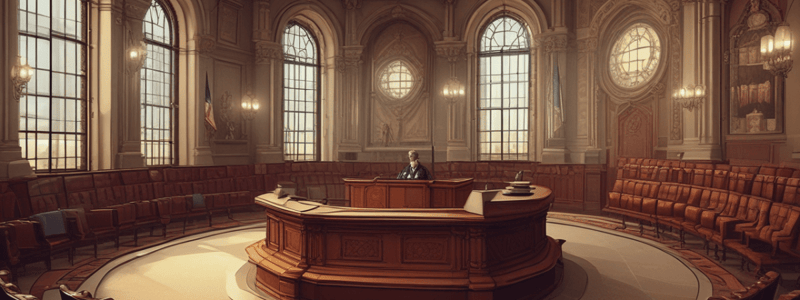Podcast
Questions and Answers
Who typically proposes legislation in a parliamentary system?
Who typically proposes legislation in a parliamentary system?
Legislation is usually proposed by the prime minister or cabinet members.
What role does the House of Lords play in the legislative process?
What role does the House of Lords play in the legislative process?
The House of Lords can pass amendments or delay legislation but cannot completely block it.
What is royal assent and who typically provides it?
What is royal assent and who typically provides it?
Royal assent is the monarch's approval of legislation, usually granted without question.
What significant powers does the monarch hold in a parliamentary system?
What significant powers does the monarch hold in a parliamentary system?
How are judges of the Supreme Court appointed in parliamentary systems?
How are judges of the Supreme Court appointed in parliamentary systems?
Flashcards are hidden until you start studying
Study Notes
Parliamentary Legislation
- Any member of parliament can propose legislation, but it usually comes from the prime minister or cabinet members.
- The governing party typically has an absolute majority in the House of Commons and can pass any legislation it wants.
- Opposition parties lack the majority in the House of Commons and have limited ability to block legislation.
The Role of the House of Lords
- The House of Lords has limited ability to block legislation and can only pass amendments or delay it.
- The House of Lords cannot stop legislation entirely.
Royal Assent
- The final step in legislation is royal assent, where the monarch signs the legislation.
- In countries like Canada, the governor-general (representative of the monarch) signs the legislation.
- The monarch has few powers, including the right to advise, dismiss parliament, call for elections, appoint the prime minister, and withhold royal assent to legislation.
Practice of Royal Assent
- In practice, the monarch always appoints the leader of the winning party as prime minister.
- The monarch dismisses parliament only when asked by the prime minister.
- The monarch never withholds assent to legislation.
The Supreme Court
- The Supreme Court has the same role as the U.S. Supreme Court in countries with a parliamentary system.
- It deals with issues of law that have significance to the country as a whole, usually based on constitutional interpretation.
Appointment of Supreme Court Judges
- Judges of the Supreme Court are appointed for life by the monarch on the advice of the prime minister.
Adaptations of the Parliamentary System
- Other countries, such as Germany, have adapted the parliamentary system.
- In Germany, the monarch is replaced as head of state by an elected president, who holds a largely ceremonial position.
Studying That Suits You
Use AI to generate personalized quizzes and flashcards to suit your learning preferences.




